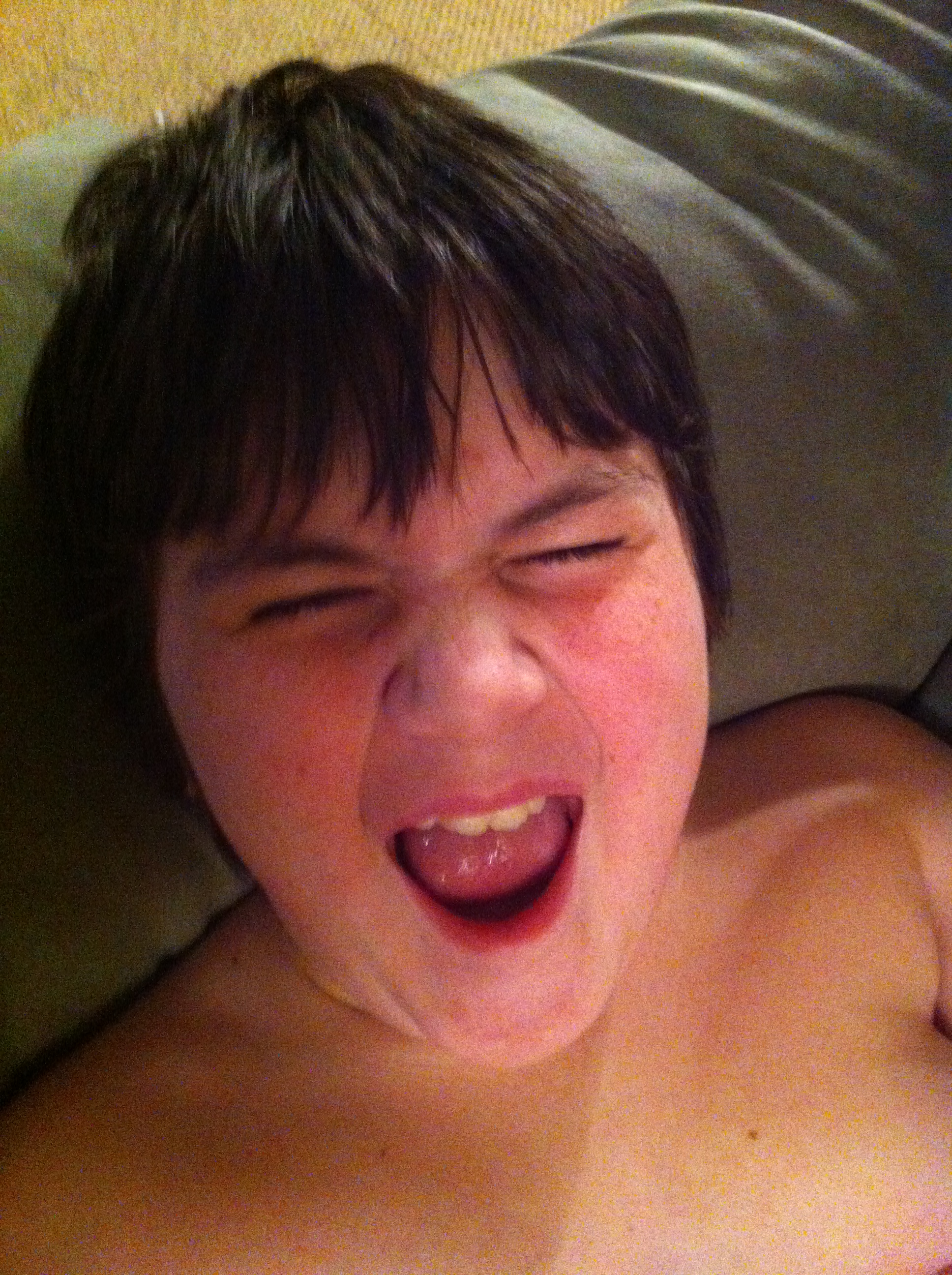 Got your attention, didn’t I?
Got your attention, didn’t I?
We’ve been in a great rhythm for a while now, and it’s been glorious. Rituals and routines: check. Handy sensory tools to take to outings: check. Restricted diet: check. Digestive enzymes: check. Pre-meltdown signs identified and used to head him off at the pass: check.
A couple of weeks ago, I noticed that the pants my 9 year-old son was wearing just a few days earlier were suddenly three inches too short. Did I use the wrong drier setting…? Then I saw acne. Then peach fuzz above his lip.
“Honey? Your voice sounds funny – are you coming down with a cold? Feeling okay?”
Then it hit me like a brick to the back of the head: big P, here we come.
Having a daughter first that went through full puberty at 8 (ACK!) I really didn’t think I had anything to worry about: I thought I had it in the bag. Easy – whiny, emotional, easily irritated, overreacting to things – then a smooth ride until the following month. Of course boys are different, but when you add precocious puberty with a splash of Autism you get an interesting cocktail. The hormones seem to sneak in and reconfigure many of the connections we’ve worked so hard to attain.
What to expect
Unexpected rage over small incidents. Proper magnitude of a situation was always an issue with us. We’ve really come a long way learning appropriate responses, but with some of these reactions it’s as if we’re now starting all over again.
Sleep schedule run amok. There has been a magnified wave of insomnia in our house, followed by 15-16 hour stretches of sleep for no apparent reason. Our old rituals and occasional use of melatonin are now ineffective.
New food likes / dislikes and bizarre cravings. Good thing I went to Sam’s Club and bought a giant, industrial-sized box of his favorite snack food… that he suddenly hates  Ugh. I caught him spreading Nutella on a dog biscuit the other day and slapped it out of his hands in panic! The good news? He’s trying new foods. It’s all about perspective. <Kidding – no child in my house eats dog biscuits!!
Ugh. I caught him spreading Nutella on a dog biscuit the other day and slapped it out of his hands in panic! The good news? He’s trying new foods. It’s all about perspective. <Kidding – no child in my house eats dog biscuits!!
Lack of appetite followed by devouring a week’s worth of groceries. I know this one is not unique to children on the Spectrum, it’s part of having a t(w)een boy. I still found myself quite financially unprepared for living with Garfield. Anyone know a good Gluten-Free lasagna recipe?
Being overly affectionate. This is a sticky-wicket, especially because I’m a single mom. There have been some shockingly inappropriate… acts of curiosity… that I’ve swiftly nipped in the bud! I will probably need some more assistance with this topic, however, as my expertise ends with Judy Blume books and creating the perfect chocolate/salt balance about three days out of the month. Calling all male role models… help! STAT!
Exhibiting desires to control family members and pets. For some reason, my boy is getting some sort of payoff from cornering me or his sister and not letting us pass through a room, blocking us from getting something in the kitchen, and mildly terrorizing the puppy. There is an underlying theme for the sudden desire to be the “capo di famiglia” (head of household). Yeah… that’s not gonna happen. Thank you, drive through!
No desire to keep up hygiene. Both my kids exhibited this strange behavior at the onset of puberty. It takes an Act of Congress to get them into the shower more than once a week. I simply can’t relate… but I have to stick to my guns.
Regression of old behaviors. Some of the old impulsivity is rearing its ugly head, along with stimming, toileting accidents, and blurting out loud noises. It really feels as if he is choosing this behavior; it has a deliberate tone to it. However, when disciplined he is honestly surprised that he is in trouble and is truly not sure what he did. The difference now is that he internalizes it and tells everyone he’s stupid. That’s not good.
What do you do?
Open communication. The number one thing you can do is make sure your child feels safe to talk about anything with you. With Autism, you may hear questions and perspectives you’ve never encountered in this arena. It’s so important to keep an open dialogue about what he is experiencing, this will set a solid foundation that will hold up any future issues and surprises with grace.
Rinse and repeat. It takes time to create new habits. 21 consecutive days, actually. Don’t expect your child to embrace these new hormones and feelings without some confusion and resistance. Remain patient and be prepared to explain, instruct, and remind your child about virtually everything. You will be repeating yourself, so get used to it 
Gently establish new routines and rituals. Don’t cry over what used to work. Life is meant to be fluid. I used to feel like such a failure when I couldn’t command a successful routine 100% of the time. Now my attitude is, “We’re going to try this for a while and see how it goes.” If it stops working, we make small course changes. It took me almost 40 years to learn that small, consistent adjustments make a much more profound impact than the extreme and rigid ways I would try to enforce a schedule I thought “should” work. Not to mention all the energy expended feeling bad about my “shoulds”. Now that energy is freed and I can focus on our next step. The flow is so much nicer!
Exercise! Physical movement is always a priority, but it’s really critical during puberty. We start off each morning with Superbrain Yoga. Since I work out every morning for my own sanity, my son will sometimes mimic what I’m doing (or his version of it). There are currently no structured sports or activities in our repertoire, so walks with the dog, back yard exploring, and regular trips to the neighborhood bouncy house definitely help. When the weather gets a little less infernal we will be trying some more challenging activities.
Find a creative outlet. If you have a child with Autism, I’m sure you are no stranger to their current obsession. Rather than meeting it with resistance because YOU think the interest is excessive, try expanding on it. For example, my child lives, breathes, and eats Super Mario Brothers. We’ve found a computer program that goes above and beyond playing the various games: he gets to create custom levels. He puts them to music, assigns characters, powers, scenes, dialogue, and criteria to his games like he’s been designing all his life. What an awesome gift!
Establish ‘mommy time’ boundaries. Now more than ever it is imperative that you carve out sacred time for yourself. You may feel selfish and neglectful when you first attempt this, especially if you work. But the benefits are two-fold: you are getting a much needed and deserved break to replenish your spirit, and you are teaching your child how to do the same for himself. Making sure you are balanced and happy is the greatest gift you can give your entire family.
Celebrate the good choices. No matter how small you think it is, it’s a big deal that your child is able to make a connection, follow a thought, and make a positive choice. You may feel as if your child is too old, but throwing a verbal party when you catch him being good will really shift unwanted behaviors quickly!
What about you? Have you ventured down this path yet? What things helped you tame the beast? Feel free to share by commenting below or posting on the SOA Facebook page – I’d love to hear your stories!















